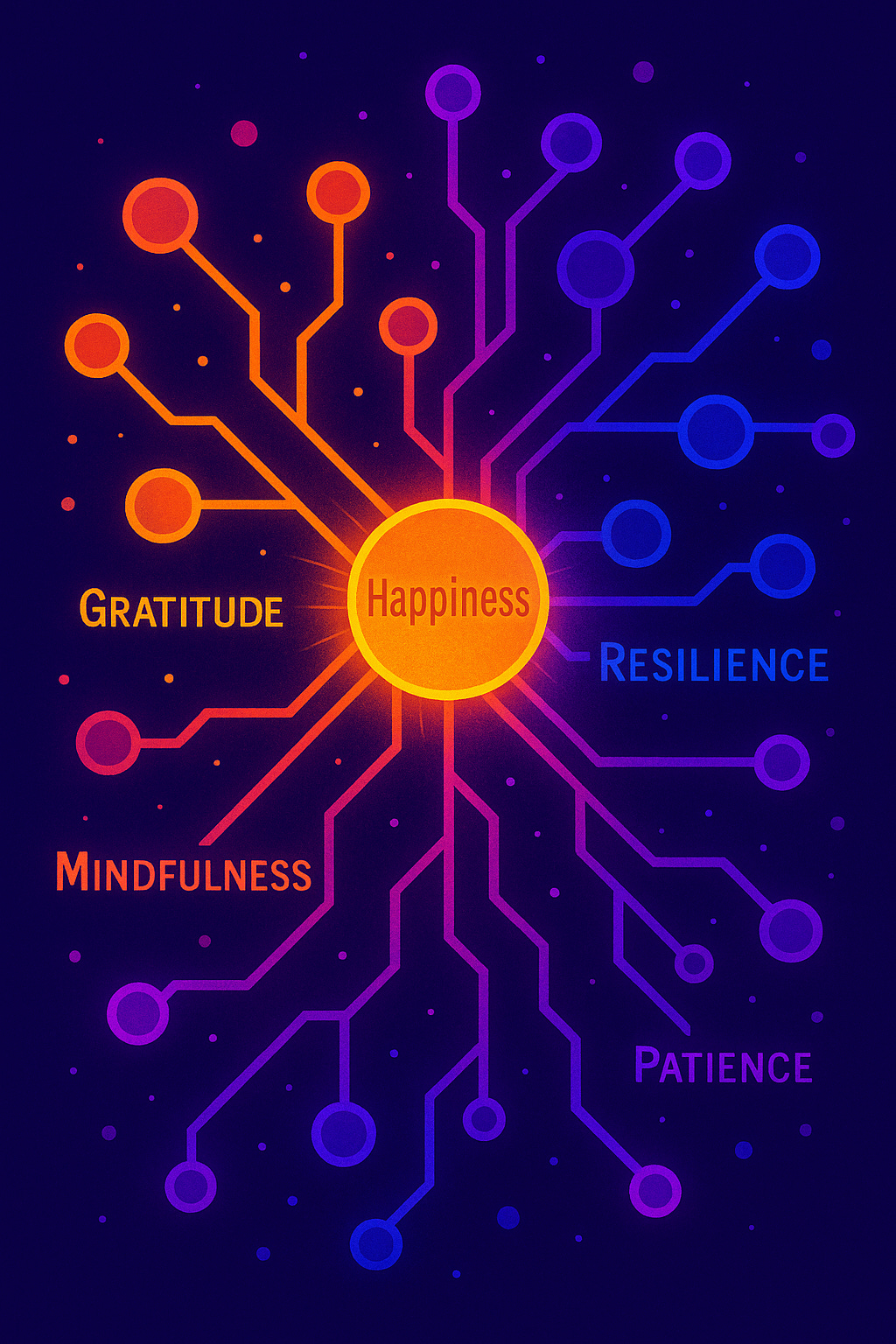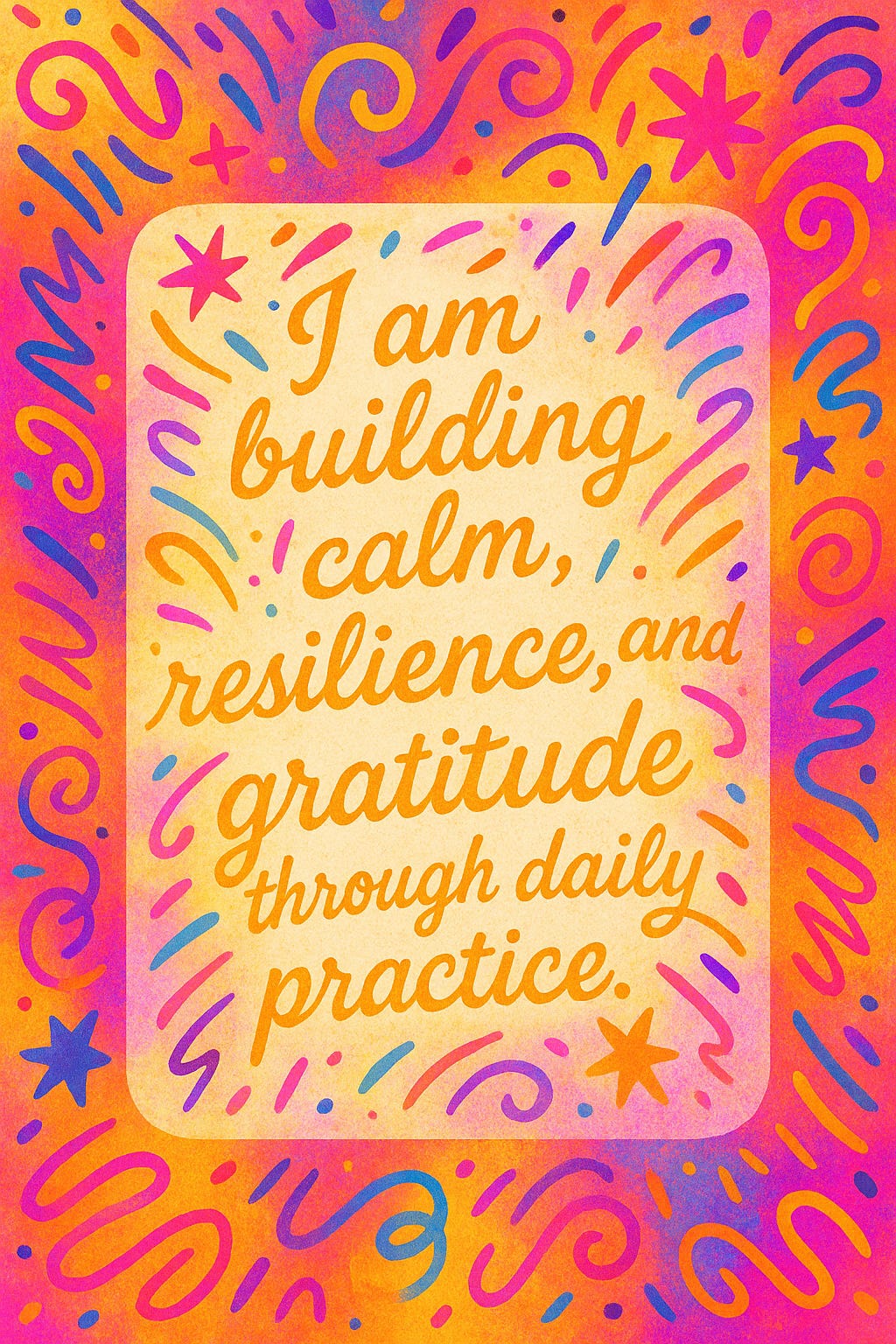Sunday Longread: You’re Not Broken. You’re Just Untrained.
Happiness isn’t your factory setting, it’s your most important skill.
You’ve been told a dangerous little story your whole life.
That you were born happy. That life is good unless something or someone breaks you. That if you wake up feeling heavy while everyone else seems light and effortless, the problem must be you. That you’re defective.
This is a lie. A beautiful, cruel, persistent lie.
You’re not broken. You’re untrained.
And that’s the good news. Because happiness isn’t something you lost along the way. It isn’t something everyone else was given but you weren’t. It’s a skill you can build. A craft you can sharpen. A habit you can own.
If you can grind through the things that break you down, you can grind through the things that build you up. Same mechanics. Better payoff.
Train Your Perception
Learn to see through the myth of default happiness.
RUN A WEEK-LONG AUDIT OF THE PEOPLE YOU ENVY MOST: For the next seven days, observe one or two “happy” people you secretly envy. Watch them closely, especially in unguarded moments. Notice when irritation, insecurity, or disappointment peek through. Write down at least three times you saw their mask slip. This will remind you: everyone is acting, and the illusion of perfect contentment is just that — an illusion.
COLLECT A PRIVATE CONFESSION: Pick one trusted friend or colleague and ask them privately, “What’s the hardest thing you’re dealing with right now?” Say it lightly, with genuine curiosity. Listen without judging. File their honesty away as evidence that everyone carries their own darkness, even if they hide it well.
STUDY HOW OTHERS CHASE THE TREADMILL: Pay attention this month to how quickly the people around you lose excitement after a big milestone- the new job, the new relationship, the big purchase. Write down what you notice about how fleeting their highs are. Use this as a lesson: don’t attach your happiness to the next fix.
Happiness Is Practice, Not Personality
We love to tell ourselves that happiness is a matter of luck. Some people are just born cheerful. It’s in their nature. They wake up glowing while the rest of us stumble through our days.
This is comforting, because it excuses us. If happiness is a personality trait, then we’re off the hook. We can stay cynical and bitter, convinced that it just isn’t “in us.”
But it isn’t true.
Happiness is not inherited like your eye color. It is built, like your body, your network, or your reputation, through repeated, intentional effort.
And the sooner you see it this way, the sooner you stop envying people for what you assume they “are,” and start outworking them at what they’ve quietly trained.
This idea isn’t new. Aristotle called happiness an activity of living well, a way of acting over time, not a fleeting mood. In his view, a good life wasn’t luck or divine favor, but the result of consciously shaping your habits and choices. You didn’t “have” happiness — you earned it through character and practice.
Modern science agrees.
Psychologist Sonja Lyubomirsky’s research shows that while genetics and circumstances play some role, about 40% of your happiness comes down to deliberate choices and habits. You know this as neuroplasticity- your brain circuits literally reshape in response to how you think and behave.
Richard Davidson, one of the leading affective neuroscientists, puts it bluntly: “Well-being is a skill. Fundamentally no different than learning to play the cello. If you practice, you improve.”
This is the great secret: people who seem naturally happy aren’t fundamentally different. They’ve simply been practicing longer, consciously or unconsciously.
Practice Strategically
Treat happiness as a craft you actively work on every day.
PICK ONE SKILL TO TRAIN THIS WEEK AND TRACK IT: Choose just one: gratitude, resilience, mindfulness, patience. Write it down and commit to practicing it every day for seven days. Keep a simple log at the end of each day: what did you actually do to practice? Be specific.
BUILD ONE DAILY RITUAL THAT RAISES YOUR BASELINE: Identify a tiny habit you can repeat daily like journaling three things you’re grateful for, walking for ten quiet minutes, or doing three deep breaths at lunch. Commit to it for 30 days, no exceptions. Post the habit on your wall or calendar to keep yourself honest.
SCORE YOURSELF EACH NIGHT: Before you sleep, rate yourself from 1–10: “Did I act like someone training to be happier today?” This is about effort, not mood. Write your score down for accountability.
WRITE AND SEND ONE GRATITUDE NOTE: Pick one person who’s made your life easier this year. Write them a short, sincere message thanking them, and actually send it. Not only does this deepen your bond with them, it cements your own practice of gratitude.
LIST THREE SMALL WINS FROM TODAY: At the end of each day, write down three tiny victories. It doesn’t matter how small: making your bed, staying calm in traffic, texting your mom back. This trains your brain to notice progress and control your own narrative.
REPLACE ONE COMPLAINT WITH A PUBLIC THANK-YOU: The next time you’re tempted to whine at work, at home, or with friends, stop yourself. Pivot instead to gratitude out loud. Watch how the energy in the room changes, and how your own mind softens when you do.
Why There’s No Quick Fix
We are obsessed with shortcuts.
We tell ourselves we’re just one insight away. One book, one therapist, one vacation, one person who “gets” us. We believe there must be a secret that other people know: some inner switch they flipped that left them permanently happy.
We believe this because it absolves us of responsibility. If happiness is a magical event that happens to you, then there’s nothing you can do but wait.
But the truth is harsher and more liberating.
There is no switch. There never was.
Even people who appear effortlessly happy are constantly working, consciously or not, to maintain it. They may not tell you that part. Some even prefer you believe they were born that way. It flatters them. It keeps you envious and them admired.
Don’t fall for it.
The reason there’s no quick fix is simple: your brain is built to adapt. Psychologists call this hedonic adaptation, or more colloquially, the hedonic treadmill.
When something wonderful happens, you get promoted, you fall in love, you buy that perfect apartment, your happiness spikes… but only for a while. Then it drops back down to your emotional baseline. You acclimate. The newness fades. You start hungering for the next fix.
That’s why chasing external milestones never works long-term. The high wears off. The treadmill keeps moving.
Even worse, the more you rely on external events for your happiness, the more power you give away. You become dependent on circumstances you can’t control. You hand over the reins of your mind to luck, to other people’s approval, to the next shiny prize.
If you want to own your happiness you need to stop looking for switches and start rewiring the board itself. Slowly. Deliberately. Patiently.
That’s what the truly powerful people do. They’re not chasing dopamine hits; they’re cultivating baseline resilience. Their happiness is not a mood that depends on weather or gossip or Instagram likes. It’s a trained default.
At first, it feels like nothing’s happening. You meditate and feel silly. You express gratitude and it feels fake. You take care of your body and don’t feel better yet.
But over weeks and months, these choices accumulate. Like compound interest, your baseline rises. You stop swinging wildly between elation and despair. You find a calm that others mistake for innate confidence.
You didn’t find the magic switch. You built the circuit yourself. And nobody can take it from you.
Get Off the Treadmill, Own Your Narrative
Stop leaking pain into the world and start controlling your frame.
WRITE A PRIVATE MISSION STATEMENT FOR YOUR HAPPINESS: Craft one sentence that defines happiness as something you’re building, not something you’re owed. Example: “I am building a baseline of calm, resilience, and gratitude through daily practice.” Write it on a card and keep it in your wallet or journal.
REWRITE YOUR OWN STORY: On paper, describe yourself not as broken or unlucky, but as a tactician-in-training: someone strategically cultivating their mind. Call your unhappiness an untrained soldier, not a doomed fate. Give yourself a protagonist arc and let your behavior align with that story
CHOOSE ONE QUIET “TELL” OF YOUR NEW BASELINE: Pick one subtle, visible behavior that signals steadiness like maintaining a calm tone under pressure, making deliberate pauses before responding, or greeting people warmly every time. Practice it daily. Let others notice without you announcing it.
STOP TELLING PEOPLE YOU’RE WORKING ON YOURSELF: Refrain from broadcasting your self-improvement. Keep it private and quiet. Let others assume you’ve always been this steady, while you quietly put in the reps. It’s more powerful, more effective, and harder to fake.
IDENTIFY AND CREATE DISTANCE FROM TOXIC INFLUENCE: Write down one person in your circle whose constant negativity drags you down. Make a concrete plan to reduce your exposure to them, even if only slightly. Schedule fewer calls. Decline one invitation. Protect your baseline by curating your proximity.
What Practice Actually Looks Like
You’ve accepted that there’s no default happiness. You’ve stopped waiting for the switch. You’ve even stopped envying people who pretend they flipped it.
Good. Now what?
Here’s what most people do at this stage: they consume. They scroll mental health threads, buy journals they never use, binge self-help videos while sitting in the same stale fog. They confuse thinking about happiness with practicing it.
This is temporary distraction. No real change. Because what they’re really doing is numbing, not practicing.
If you’re serious, you need to learn the distinction between passive pleasures and active gratifications.
Passive pleasures are easy. You scroll. You eat something indulgent. You buy a little treat. You vent on group chat. You feel good, but only for a moment. The baseline doesn’t budge.
Active gratifications are harder, but they actually train you. You write down what went right today, even when it feels like nothing. You reach out to someone just to tell them something kind. You walk outside and look up instead of down. You replace a habitual complaint with deliberate gratitude.
These are not glamorous. They don’t feel profound at first. They feel like work.
But that’s the point. Work is what makes them stick. Work is what makes them yours.
Here’s the real secret: happy people do these small acts even when they don’t feel like it. That’s what separates them. They don’t wait to feel inspired. They don’t even wait to believe it’s working. They simply keep showing up, knowing that every little rep strengthens their baseline over time.
And there’s a quiet power in these practices. People feel it when you’re grounded. They respond to you differently when you walk into a room projecting calm and contentment that isn’t fragile. That kind of quiet confidence is magnetic and it’s impossible to fake for long.
Nobody will clap for you. Nobody needs to. You’re building leverage over yourself, and that’s the rarest, most transferable power there is.
Earn It. Keep It. No One Can Take It.
You already know how to show up for the things that matter: your job, your family, your reputation. You already know how to drag yourself out of bed when nobody’s watching. You already know how to endure discomfort and keep going.
So show up for yourself.
Not because you’re broken. Not because you need fixing. Not even because it will make you feel better right away. But because it’s the work of being human. Because nobody else can do it for you. Because earned happiness is unshakable, and even a little intimidating to everyone watching.
The happiest people you know aren’t luckier than you. They just learned to play their cards better. Ruthlessly. Well. That’s the essence of sovereignty: you stop blaming your wiring. You stop leaking pain for pity. You turn it into leverage.
You earn your happiness. And nobody can take it from you.
Not life. Not luck. Not them.
So stop waiting for the switch. Stop calling yourself broken.
Pick up the chisel. Build the circuit. And get to work.
You’re not broken. You’re just untrained. For now.








"It's the work of being human." Wow. Articulated so well, Harnidh! Loved this, as always <3